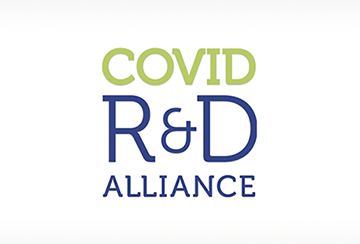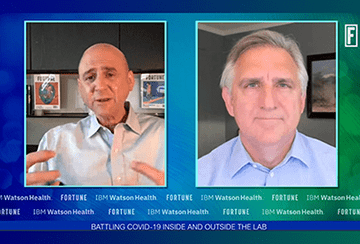How common is it for people to be infected with the SARS-CoV-2 virus but have no symptoms at all or only mild cold-like symptoms? How does the virus spread once it enters a region, and how quickly does it acquire new mutations?
A new study from deCODE Genetics, a subsidiary of Amgen, is providing the world with hard data that will help to answer these questions. Conducted in collaboration with Iceland’s health authorities, the study is one of few published so far to test both high-risk individuals and people with no known risk factors to assess the true prevalence of SARS-CoV-2 infections.
To go deeper, deCODE also sequenced viral samples taken from 643 individuals to identify distinct strains of the virus and learn how it arrived in Iceland and spread and mutated after its arrival. The results, published in the New England Journal of Medicine (NEJM) on April 14, underscore the effectiveness and necessity of aggressive testing, isolation of cases, and physical distancing, as well as the urgency of more testing to contain the virus and prevent disease.
“Our civic duty”
In the worldwide battle against COVD-19, health authorities have generally focused their testing resources on people with symptoms of infection, such as fever, dry cough, and difficulty breathing. But to really understand the virus—how lethal it is and how many of those infected get serious illness—it’s important to gauge the true prevalence of infection in the general population.
As the pandemic reached Iceland, Kári Stefánsson, the CEO and founder of deCODE, saw an opportunity to apply deCODE’s scientific expertise to this challenge. “We are a very small country with a population of 360,000,” he observed. “There are not a lot of resources in the country to do work like this. But deCODE has the resources, so we have looked at this as our civic duty to do this testing.”
“When Kári conceived this idea in early March, we assured him that we would provide the resources and support necessary to move quickly,” said Dave Reese, executive vice president, R&D. “Stopping the spread of COVID-19 is the biggest challenge the world has faced in decades, so there’s no better use right now for deCODE’s world-class analytic and sequencing capabilities.”
In partnership with Iceland’s health care authorities, deCODE quickly repurposed its scientific talent and resources to do up to a thousand or more SARS-CoV-2 tests daily. While the National University Hospital of Iceland (NUHI) continued to test individuals with symptoms, a history of travel to high-risk areas, or contact with infected individuals, deCODE issued an open invitation to the general public to volunteer for screening. Starting on April 1, deCODE augmented its open screening program by inviting randomly selected Icelanders between age 20 and 70 to be screened.
“We have substantial experience in dealing with population data, and that turns out to be valuable when it comes to screening for a virus like COVID-19,” said Kári. “We have been working 24/7 to screen for and sequence the virus.”
Detecting hidden infections
Results from the NEJM study showed that, as of April 4, 13.3% of the 9,199 high-risk individuals screened by NUHI tested positive for the virus. Women were less likely than men to test positive (11% versus 16.7%), and children under 10 were at also lower risk for infection (6.7%).
Of the 10,797 volunteers tested by deCODE in the open invitation screening, 87 individuals (0.8%) tested positive. In random screening conducted from April 1 to April 4, 13 of 2,283 people screened (0.6%) tested positive. In the combined open invitation and random screening efforts, 43 of the 100 positive test results were in individuals who reported no symptoms at the time they were tested, and the remaining positive tests were in people with mild cold-like symptoms, such as cough and runny nose.
deCODE’s sequencing of the virus showed that there were a variety of haplotypes, or strains of SARS-CoV-2, present in Iceland. The first wave of infections to hit the country was linked primarily to strains that came in with travelers returning from Italy and Austria.
In the smaller number of infections detected through deCODE’s screening, strains derived from travel to the UK and the US were more common – countries that had not yet been designated high-risk areas when the Icelanders who tested positive were travelling there. The finding provides fresh evidence that the virus can be present in populations weeks before large numbers of people start to show symptoms.
Over time, the number of travel-related infections in Iceland declined significantly, as did the number of infections linked to social activity, highlighting the effectiveness of social distancing and Iceland’s ban on large gatherings. Since late March, most of the new cases in the country have come through exposure to infected family members or unknown sources.
deCODE also identified 409 sequence variants, or mutations, in the virus samples it tested. That included 291 new mutations that are not reported in the GISAID database (Global Initiative on Sharing All Influenza Data).
More screening planned and needed
The screening done by deCODE will have immediate and practical public health benefits, as apparently healthy individuals who are nonetheless infected are informed and isolated to reduce further spread of the virus. On a per capita basis, Iceland has mounted the most extensive SARS-CoV-2 testing effort of any nation, and the study results underscore the need for continued testing, Kári said.
“We have screened more than anyone else, and that has been done to find the cases that are looming in society that are not being caught by the health care system,” said Kári. “We have had aggressive tracking of those infected, and we have been very aggressive in putting people into quarantines. And that has worked.”
“To bend the curve of this pandemic as quickly as possible, we need scientifically accurate information on how COVID-19 spreads in communities,” said Robert A. Bradway, chairman and chief executive officer at Amgen. “I believe deCODE’s swift response to this emergency and the insights they have generated will give the rest of the world a stronger scientific foundation for public health decisions.”
The Icelandic health authorities and deCODE are continuing their respective testing programs for high-risk individuals and members of the general public, with new data posted daily on https://www.covid.is/data. deCODE has also received permission from Iceland’s health authorities to add the COVID-19 data to its comprehensive database of genetic and health information on Iceland’s population. Combining these data sets could lead to fresh insights on genetic and health-related factors that might influence the risk for infection and the severity of illness among those infected.
Amgen Forward-Looking Statements
This communication contains forward-looking statements that are based on the current expectations and beliefs of Amgen. All statements, other than statements of historical fact, are statements that could be deemed forward-looking statements, including any statements on the outcome, benefits and synergies of collaborations, or potential collaborations, with any other company, including Adaptive Biotechnologies (including statements regarding such collaboration’s ability to discover and develop fully-human neutralizing antibodies targeting SARS-CoV-2 to potentially prevent or treat COVID-19), BeiGene, Ltd., or the Otezla® (apremilast) acquisition, including anticipated Otezla sales growth and the timing of non-GAAP EPS accretion, as well as estimates of revenues, operating margins, capital expenditures, cash, other financial metrics, expected legal, arbitration, political, regulatory or clinical results or practices, customer and prescriber patterns or practices, reimbursement activities and outcomes, effects of pandemics or other widespread health problems such as the ongoing COVID-19 pandemic on our business, and other such estimates and results. Forward-looking statements involve significant risks and uncertainties, including those discussed below and more fully described in the Securities and Exchange Commission reports filed by Amgen, including our most recent annual report on Form 10-K and any subsequent periodic reports on Form 10-Q and current reports on Form 8-K. Unless otherwise noted, Amgen is providing this information as of the date of this news release and does not undertake any obligation to update any forward-looking statements contained in this document as a result of new information, future events or otherwise.
No forward-looking statement can be guaranteed and actual results may differ materially from those we project. Our results may be affected by our ability to successfully market both new and existing products domestically and internationally, clinical and regulatory developments involving current and future products, sales growth of recently launched products, competition from other products including biosimilars, difficulties or delays in manufacturing our products and global economic conditions. In addition, sales of our products are affected by pricing pressure, political and public scrutiny and reimbursement policies imposed by third-party payers, including governments, private insurance plans and managed care providers and may be affected by regulatory, clinical and guideline developments and domestic and international trends toward managed care and healthcare cost containment. Furthermore, our research, testing, pricing, marketing and other operations are subject to extensive regulation by domestic and foreign government regulatory authorities. We or others could identify safety, side effects or manufacturing problems with our products, including our devices, after they are on the market. Our business may be impacted by government investigations, litigation and product liability claims. In addition, our business may be impacted by the adoption of new tax legislation or exposure to additional tax liabilities. If we fail to meet the compliance obligations in the corporate integrity agreement between us and the U.S. government, we could become subject to significant sanctions. Further, while we routinely obtain patents for our products and technology, the protection offered by our patents and patent applications may be challenged, invalidated or circumvented by our competitors, or we may fail to prevail in present and future intellectual property litigation. We perform a substantial amount of our commercial manufacturing activities at a few key facilities, including in Puerto Rico, and also depend on third parties for a portion of our manufacturing activities, and limits on supply may constrain sales of certain of our current products and product candidate development. An outbreak of disease or similar public health threat, such as COVID-19, and the public and governmental effort to mitigate against the spread of such disease, could have a significant adverse effect on the supply of materials for our manufacturing activities, the distribution of our products, the commercialization of our product candidates, and our clinical trial operations, and any such events may have a material adverse effect on our product sales, business and results of operations. We rely on collaborations with third parties for the development of some of our product candidates and for the commercialization and sales of some of our commercial products. In addition, we compete with other companies with respect to many of our marketed products as well as for the discovery and development of new products. Discovery or identification of new product candidates or development of new indications for existing products cannot be guaranteed and movement from concept to product is uncertain; consequently, there can be no guarantee that any particular product candidate or development of a new indication for an existing product will be successful and become a commercial product. Further, some raw materials, medical devices and component parts for our products are supplied by sole third-party suppliers. Certain of our distributors, customers and payers have substantial purchasing leverage in their dealings with us. The discovery of significant problems with a product similar to one of our products that implicate an entire class of products could have a material adverse effect on sales of the affected products and on our business and results of operations. Our efforts to collaborate with or acquire other companies, products or technology, and to integrate the operations of companies or to support the products or technology we have acquired, may not be successful. A breakdown, cyberattack or information security breach could compromise the confidentiality, integrity and availability of our systems and our data. Our stock price is volatile and may be affected by a number of events. Our business performance could affect or limit the ability of our Board of Directors to declare a dividend or our ability to pay a dividend or repurchase our common stock. We may not be able to access the capital and credit markets on terms that are favorable to us, or at all.



